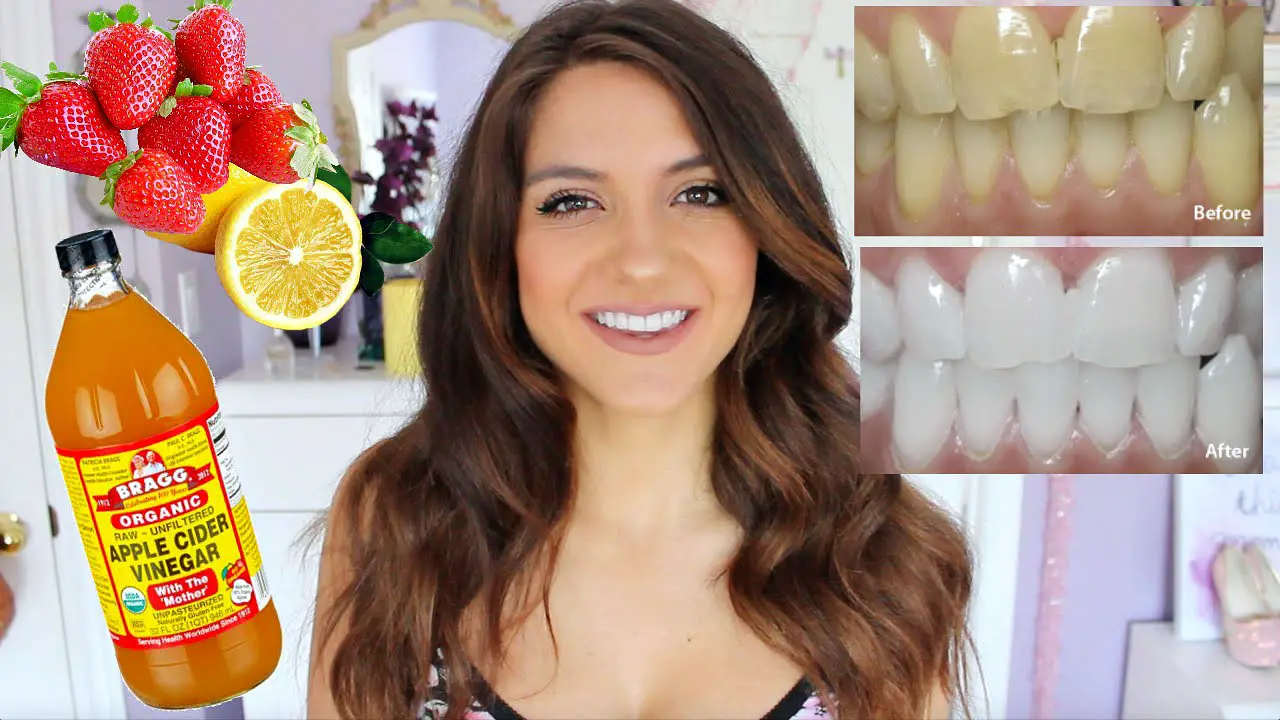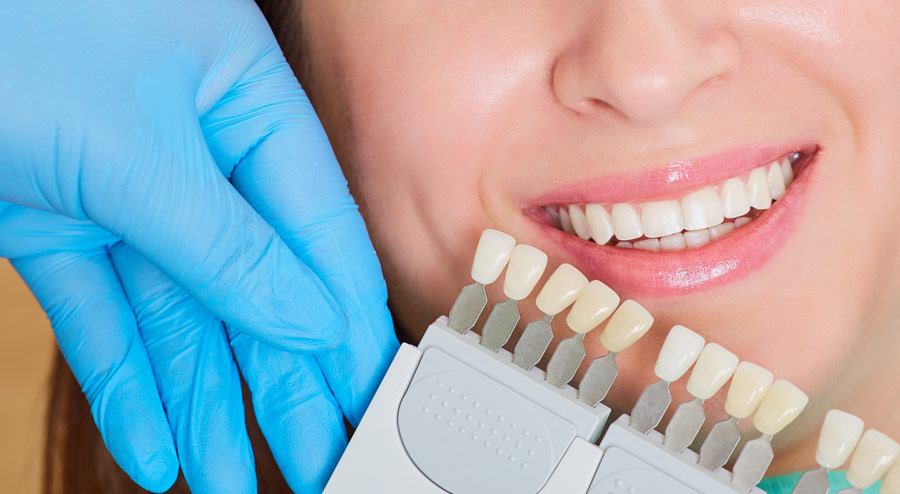Vinegar for Teeth Whitening

Apple cider vinegar is not recommended for teeth whitening due to its high acidity, which can cause tooth enamel damage and make teeth appear more yellow.
Natural Teeth Whitening Methods
Vinegar is a popular natural ingredient for teeth whitening. It contains acetic acid that helps remove surface stains and kill bacteria in the mouth.
Eating Strawberries
Strawberries contain malic acid, which can help whiten teeth naturally. Enjoy these sweet treats as a delicious way to brighten your smile.
Rinsing With Apple Cider Vinegar
Apple cider vinegar has antimicrobial properties that can aid in teeth whitening. Dilute it with water and use it as a mouthwash to kill bacteria and remove stains.
Applying Coconut Oil
Coconut oil pulling is a traditional remedy for oral health. Swishing coconut oil in your mouth can help reduce bacteria and plaque, contributing to whiter teeth.
Using Baking Soda And Hydrogen Peroxide
Create a paste using baking soda and hydrogen peroxide to gently scrub away surface stains on teeth. Use this natural remedy sparingly to avoid enamel damage.

Credit: www.facebook.com
Safety Concerns
When it comes to using vinegar for teeth whitening, it is important to be aware of the safety concerns associated with this method. Although vinegar has been praised for its natural teeth whitening properties, there are a few factors to consider that may affect the health and integrity of your teeth. Let’s explore the potential safety concerns in detail.
Deterioration Of Tooth Enamel
Vinegar, especially apple cider vinegar, is known for its acidic properties. While a slightly acidic environment can help break down stains and brighten your smile, prolonged exposure to vinegar can lead to the deterioration of tooth enamel. Tooth enamel is the protective layer that covers the outer surface of your teeth. It is the hardest substance in the human body and safeguards your teeth from decay and sensitivity. However, the acids found in vinegar can gradually wear away this enamel, leaving your teeth prone to damage and discoloration.
Potential Tooth Damage From Acidity
The acidity of vinegar can also pose a potential risk for tooth damage. Acidic substances have the ability to soften and erode tooth enamel, making it more vulnerable to cavities, sensitivity, and decay. While the acidic properties of vinegar can contribute to teeth whitening by breaking down surface stains, it is essential to be cautious about overusing vinegar as a whitening treatment. Excessive exposure to acidic substances like vinegar can weaken tooth structure and compromise oral health.
To prevent any negative effects, it is recommended to dilute vinegar when using it for teeth whitening purposes. Mix one teaspoon of vinegar with a cup of water to lower its acidity while still maintaining its effectiveness. Additionally, it is advisable to rinse your mouth with plain water after using vinegar to neutralize the acidity and protect your tooth enamel.
It is important to note that there are alternative teeth whitening methods available that are less abrasive and have been proven to be safe and effective. Consulting with a dental professional is always recommended before incorporating any new dental care regimen into your routine.
Myth Vs. Reality
When it comes to natural teeth whitening remedies, vinegar has gained popularity as a cost-effective and accessible option. However, there are several misconceptions surrounding the use of vinegar for teeth whitening. In this section, we will separate the myth from reality by exploring the acidic nature of vinegar and debunking common misconceptions. Let’s dive in and discover the truth about vinegar for teeth whitening.
Acidic Nature Of Vinegar
Vinegar, whether it’s apple cider vinegar or white vinegar, is known for its acidic properties. The acidity plays a crucial role in breaking down dental plaque and stains on the teeth, which can contribute to a whiter smile. The high acidity level of vinegar helps remove surface stains by eroding the outer layer of the tooth enamel, revealing a cleaner and brighter appearance.
Important to note: The acidic nature of vinegar means it should not be overused or applied directly to the teeth without dilution. Excessive use or undiluted application can lead to enamel erosion and tooth sensitivity. It is essential to use vinegar in moderation and alongside proper oral hygiene practices.
Misconceptions About Vinegar And Teeth Whitening
There are several misconceptions surrounding the use of vinegar for teeth whitening that need to be addressed:
- Myth 1: Vinegar can instantly whiten teeth: While vinegar’s acidity can help remove surface stains, it is not a magical solution for instantly whitening teeth. Teeth whitening is a gradual process, and consistent usage of vinegar may produce noticeable results over time.
- Myth 2: Any vinegar can be used for teeth whitening: Vinegar varieties like apple cider vinegar are commonly recommended for teeth whitening due to their additional antimicrobial and antioxidant effects. White vinegar, on the other hand, may not provide the same benefits and could be less effective.
- Myth 3: Vinegar is a substitute for professional teeth whitening: While vinegar may help remove some surface stains, it is not a substitute for professional teeth whitening procedures. Professional treatments can provide more significant and long-lasting results by targeting deeper stains and discoloration.
Remember: It is always advisable to consult with a dentist before incorporating any teeth whitening remedies into your oral care routine. Your dentist can provide personalized guidance and recommend the best course of action for your specific needs.
In conclusion, vinegar can be a beneficial aid in teeth whitening, provided it is used correctly and in moderation. Understanding the acidic nature of vinegar and debunking misconceptions will help you make informed decisions about incorporating this natural remedy into your oral care routine. Keep in mind that vinegar should always be used as a supplementary method and not as a substitute for professional teeth whitening treatments.

Credit: www.emergencydentistsusa.com
Alternative Natural Remedies
Using a mixture of salt and apple cider vinegar can provide a natural solution for teeth whitening. The combination of these ingredients can help remove surface stains effectively.
Different types of vinegar, such as apple cider vinegar and white vinegar, have been recognized for their oral health benefits. They possess antibacterial properties that can aid in killing harmful bacteria in the mouth.

Credit: ar.pinterest.com
Frequently Asked Questions For Vinegar For Teeth Whitening
Which Vinegar Is Good For Teeth?
Apple cider vinegar is good for teeth due to its antimicrobial and antioxidant effects. It helps combat oral biofilm (dental plaque). However, it’s important to dilute it with water to avoid damaging tooth enamel.
How Can I Make My Teeth Super White Fast?
To make your teeth super white fast, try natural methods like brushing, eating strawberries, and using apple cider vinegar rinse. Dilute one teaspoon of apple cider vinegar with a cup of water and use it as a mouthwash. Remember to brush your tongue and rinse with water afterward.
Avoid using undiluted vinegar to protect tooth enamel.
Is It Safe To Rinse Mouth With Apple Cider Vinegar?
Apple cider vinegar may deteriorate tooth enamel, so dilute it before using as mouthwash. Mix 1 tsp with 1 cup of water for safety.
What Home Remedy Whitens Your Teeth?
Apple cider vinegar is a home remedy that can help whiten teeth. It has antimicrobial and antioxidant effects that can reduce oral biofilms and stains. However, it is important to dilute it before using it as a mouthwash to avoid damaging tooth enamel.
Conclusion
Incorporating apple cider vinegar can effectively whiten teeth due to its antimicrobial properties. Dilute it properly to protect tooth enamel and reap the benefits. Discover a natural way to enhance your smile and oral health with apple cider vinegar. Experience the power of this simple home remedy.
